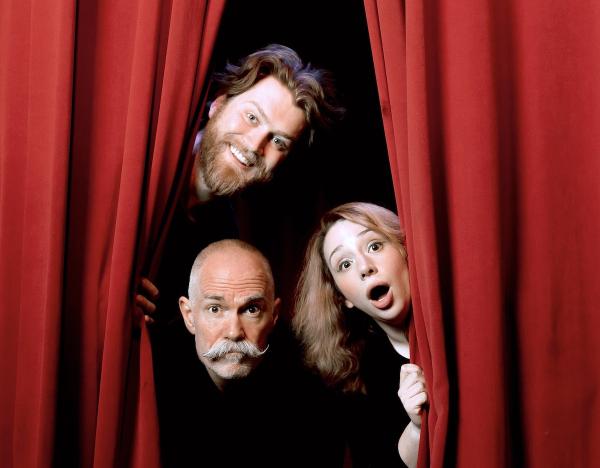November 1, 2023

(Clockwise from top) Cleveland Nicoll, Lauren Elias and Brendan O’Neill in “The Book of Will”
Photo: Tim Gurczak
We’ve all heard of William Shakespeare, playwright, poet and actor. The Bard of Avon. But have you heard of Henry Condell and John Heminges? Probably not. Yet history tells us that without the last two, we might never have heard of the first.
When Shakespeare died in 1616 very little of his work had been preserved in print. He reportedly wrote his plays in sections, never assembling all the parts into a whole until his actors were on stage. He feared his work would be stolen or plagiarized if it was available in total.
Three years after Shakespeare’s passing, two devoted members of his acting company -- The King’s Men -- are still reeling from his death when an unauthorized, badly-botched, local production of “Hamlet” sets them seething.
Frantically, they set out to collect and publish Shakespeare’s plays in what would be known as The First Folio. Thanks to the persistence and loyalty of Henry Condell and John Heminges, today we have authentic versions of “Macbeth,” “Romeo & Juliet,” “King Lear” and so many others.
Published in 1623, The First Folio contained 36 plays and sold for £1. The story of its creation is captured in “The Book of Will,” being presented by Hub Theatre Company at the Boston Center for the Arts through November 12.
Written by acclaimed playwright Lauren Gunderson, and directed by Elliot Norton Award winner Bryn Boice, the play is fiction. However, amidst the noise and color of Elizabethan London, “The Book of Will” spins a remarkable based-in-truth story of love, loss and laughter. It also sheds new light on the writer you may think you know.
In the Hub Theatre production, Brendan O’Neill plays John Heminges. A native of Salisbury, O’Neill attended Salem State University and went on to earn his MFA at the Asolo Conservatory at Florida State Conservatory.
 He spent the last 20 years in Los Angeles working as a professional screenwriter, actor, editor, script doctor and coach in the film and television industry. Recently returned to Massachusetts, Brendan currently works at Commonwealth Shakespeare Company and as an adjunct professor at Salem State University. He’s also excited to be in the process of publishing his first crime novel, “Whatever Happened to Austin Wellington?”
He spent the last 20 years in Los Angeles working as a professional screenwriter, actor, editor, script doctor and coach in the film and television industry. Recently returned to Massachusetts, Brendan currently works at Commonwealth Shakespeare Company and as an adjunct professor at Salem State University. He’s also excited to be in the process of publishing his first crime novel, “Whatever Happened to Austin Wellington?”
While his credits include productions of “Macbeth,” Hamlet” and “Two Gentleman of Verona,” he has also been seen in “Hurlyburly,” “A Streetcar Named Desire” and “Whose Life Is It Anyway?,” among others
With a self-effacing sense of humor and an easy manner, Brendan spoke about “The Book Of Will” between rehearsals. Here’s an edited look at our chat.
Q: How did you wind up joining the cast of “The Book Of Will?”
A: Bryn Boice, the director, she reached out to me. Because she needed old men (laughs). I’m an old man . . . The short version of the story is I’d heard about her for years because she went to the same graduate school as me (and my wife). And then when we moved back from L.A., someone said that Bryn was living here. And so, (again), long story short, I started working with her, working as a scene coach and as a classroom educator for Commonwealth Shakespeare Company where she’s Associate Artistic Director. She also heads the education program there. She’s brilliant. She’s just such an amazing, positive force. I watched her with students, I watched her with actors . . . So truly, when she asked me to audition for “The Book of Will,” I couldn’t say no. It was such a great opportunity to work with her. Whatever she was going to be involved in, I was there for it.
Q: You’ve explored Shakespeare quite a bit in your career. What strikes you about “The Book of Will?” What makes it special?
A: It’s just such a beautiful story of the putting together of the First Folio -- of Shakespeare’s first collection of plays -- without which, we wouldn’t have half of the plays (we have today) . . . The characters are going through such cultural identify and they’re going through such loss. Everybody’s dying around them. And it’s like, how are we going to make our mark? They’re really, I would say, suffering with these feelings of mortality -- Is this it? Is this everything that life has to offer? We’ve got to make our mark. We’ve got to ensure our legacy. And I really feel that has such an Irish tie to the previous century when Ireland was getting back its cultural identify, with all the great writers coming out and the national theatre and all that. When I knew you and I were going to be talking today (for Boston Irish), I was thinking of that correlation.
Q: It made a personal connection?
A: Over the past 20 years, I just really connected with the feeling of how a lot of good comes out of grief and loss. And so that was one of the things that really drew me to it, not just my character, but what all of the characters are going through . . . These folks are colleagues, then become really, family, and bonded. It’s such a beautiful story. I think people are really going to love it.
Q: One has to wonder how many other gifted writers of the time were forgotten because they didn’t have colleagues to pull it all together for them.
A: That’s such a great point. And I think it really, again, points to how much -- and this is such a theater thing -- we become family. I recently I went to a retirement party for a professor of mine, and he said, over the years people would come back, five years, ten years, fifteen years later, and say, “I don’t know if you remember me,” and he said, “Of course we remember you! We made art together. We don’t ever forget that!” I thought that was so powerful. And so that’s really the message with this play, too. They don’t want to forget Will Shakespeare. They don’t want anybody to forget Shakespeare He was their brother in arms. They made art together. And that bond never goes away.
Q: Do audiences need to be well versed in Shakespeare to appreciate the play?
A: I don’t think they necessarily have to have a relationship with Shakespeare. I think they just have to have that feeling of bonding and family and they’ll totally relate to it.
Q: Speaking of family, were your folks supportive or a bit cautious when you showed a professional interest in entertainment? Show business can be tough sometimes.
A: I think they were supportive only in that I was such a bad student that that this was really the only thing that captured my interest enough to get good grades . . . (laughing) I was not going to become a doctor or a lawyer, so they were thrilled that I was doing something I enjoyed.
Q: When did you know you could making a living in entertainment?
A: I’ll let you know when that day comes (laughs) . . . As I got older, I started to broaden my view of what success looked like. That it didn’t have to be a “pass or fail" thing. It could be that, if I love it, which I do, it doesn’t matter if I’m making a dollar a year or a hundred thousand dollars a year. I can find a way to be self-supporting and still keep that part of me very much alive and very much active.
Q: Before we go, tell me a bit about the book you’re working on, “Whatever Happened to Austin Wellington?”
A: It's my favorite project. I’m trying to get this published. It's about a socialite, a very “old money” socialite . . . She’s an absolute train wreck, and the novel opens up when she has shed her past. She’s gone dark and she’s basically doing small cons in Los Angeles -- a small time con woman. She and her boyfriend try to pull off a robbery with the wrong film director, and the s**t hits the fan. It’s a very Cohen Brothers crime novel. With very dumb criminals. It’s a lot of fun.
—————————————-
“The Book of Will,” Hub Theatre Company, through Nov. 12. Info: www.hubtheatreboston.org

